In this newsletter: Columbia’s downfall, Federal probe into antisemitism in the University of California system, President Folt’s interview, and a USC-led study on public opinion of student protests.

The White House is indeed serious about antisemitism on college campuses and intends to follow through on Trump’s executive orders. In our last newsletter, we wrote that the newly formed Federal Taskforce to Combat Antisemitism will visit 10 universities including USC. The last week brought additional federal action, including the cancellation of $400,000,000 of federal funding to Columbia because of their brazen and continuous Title VI violations.
While many people reflexively reject anything that emanates from the Trump administration, we prefer to judge policies and actions at face value. We agree with Ronald S. Lauder, President of the World Jewish Congress, who welcomed Trump’s decisive actions and thanked the president for taking a “firm stand against the dangerous wave of antisemitism on college campuses.” Calling for Jewish students to be protected, Lauder added, “Universities must be places of learning, not lawlessness.” This is not a partisan issue!
ED, HHS, and GSA Announce Additional Measures to End Anti-Semitic Harassment on College Campuses (US Department of Education Press Release, March 3, 2025)
Last Monday, the Department of Education announced new measures to curb antisemitism on college campuses:
Measures will include a comprehensive review of federal contracts and grants given to institutions of higher education that are being investigated for dereliction of duties to curb or combat Anti-Semitic violence and harassment.
The press release specifically mentions Title VI violations at Columbia (more on this below). It quotes Secretary of Education Linda McMahon and HHS Secretary Robert F. Kennedy, Jr.:
“Americans have watched in horror for more than a year now, as Jewish students have been assaulted and harassed on elite university campuses—repeatedly overrun by anti-Semitic students and agitators. Unlawful encampments and demonstrations have completely paralyzed day-to-day campus operations, depriving Jewish students of learning opportunities to which they are entitled,” said Secretary of Education Linda McMahon. “Institutions that receive federal funds have a responsibility to protect all students from discrimination. Columbia’s apparent failure to uphold their end of this basic agreement raises very serious questions about the institution’s fitness to continue doing business with the United States government.”
“Anti-Semitism—like racism—is a spiritual and moral malady that sickens societies and kills people with lethalities comparable to history’s most deadly plagues,” said HHS Secretary Robert F. Kennedy, Jr. “In recent years, the censorship and false narratives of woke cancel culture have transformed our great universities into greenhouses for this deadly and virulent pestilence. Making America healthy means building communities of trust and mutual respect, based on speech freedom and open debate.”
A Word of Caution from Greg Lukianoff
Writing for UnHeard, Greg Lukianoff and Adam Goldstein (Trump’s College Funding Threat Puts Free Speech at Risk, March 5, 2025) point out potential problems with the federal measures against antisemitism, focusing on Trump’s social media posts. They begin by clarifying:
Let’s start by underlining the uncontroversial part: revoking the student visas of foreign nationals if they engage in criminal activity and arresting American students who do the same. Few would disagree with such a move. Unless these were federal crimes, the federal government likely would not even have to be involved.
Their main objection is the exaggerated focus on campus protests, which—they say—themselves are not the problem. The authors are concerned, in response, there will be administrative over-compliance that will further erode free speech on campuses.
Focusing on the protests, however, is a mistake. What got colleges into this situation was a concentrated indifference to the hostile climate (and often harassment) faced by Jewish students — even as those same colleges built multi-level censorship bureaucracies around their fascination with microaggressions directed at every other intersectional category then known or later invented. Much of this bureaucracy, including the DEI offices that Trump wants to dismantle, was justified by schools as necessary to comply with vague directives under Title IX. If a new, vague rule to stop protests is put in place, colleges will over-comply with that, too.
Whether it was the intended message or not, higher education has inculcated in some portion of its community the understanding that some people don’t deserve equal protection under the schools’ rules or to be fully included in campus life. And we can reverse this trend by respecting everyone’s rights — including the right to be free from discriminatory harassment and the right to say things that may hurt someone’s feelings.
However long it took to get there, Barnard’s decision to enforce its rules is a step in the right direction. The government can encourage more colleges to do the same with bright-line federal policies which treat everyone equally, giving everyone the same protection under law while ensuring everyone has the same right to freedom of expression.
President Trump should address campus unrest by encouraging campuses to model the freedoms America promises to protect. He can do that by pushing schools to enshrine and enforce protections for freedom of speech and academic freedom, while stressing that misconduct and criminal behaviour must be punished. What he shouldn’t do is create new excuses for campuses to undermine those promises.
We agree!
Columbia: Go Woke—Go Broke
Columbia has arguably been the worst offender when it comes to campus antisemitism—evidenced by the continuous stream of deranged festivities, as seen in the media and discussed in this newsletter (see here, here, and here). From faculty using the classroom for antisemitic propaganda, to violence and vandalism, continuous disruption of campus operations by encampments and building occupations, and (above all) no accountability for perpetrators. Now the chickens have come home to roost—Columbia’s federal funding has been withdrawn to the tune of $400,000,000 due to antisemitic discrimination.
According to the New Your Times:
On Monday, Linda McMahon, the secretary of education, had warned that Columbia would face the loss of federal funding if it did not take additional action to combat antisemitism on campus.
A statement issued by four federal agencies on Friday announcing the funding cuts referred to ongoing protests and antisemitic harassment on campus, though to what extent pro-Palestinian demonstrations on campus can be considered antisemitic remains in dispute.
While we sympathize with our innocent STEM colleagues whose research will be disrupted by these measures, Columbia had this coming.
How did it come to this at Columbia and can the university be saved? Antisemitism is inherent to the woke (Critical Social Justice) ideology that pervades academia, especially our elite universities. Another facet to wokeness is opposition to free speech. How well a campus protects free speech is thus a proxy for the depth of the campus’s of wokeness and its attendant antisemitism. Just how woke Columbia is is reflected by its second-to-last-place standing in the FIRE Campus Free Speech rankings. Only Harvard was ranked lower (USC was a shameful seventh-to-last). At our recent conference, Censorship in the Sciences: Interdisciplinary Perspectives, one Columbia professor asked FIRE president Greg Lukianoff what can be done to dig Columbia out of this hole (you can listen to Greg’s talk here and to the Q&A here). Greg responded that the university should be made into a technology institute. In other words, in Greg’s opinion, the STEM departments of the university can be reformed, but the humanities, social sciences, and grievance studies departments are too deeply steeped in woke ideology to be saved.
Below, we share several articles pertaining to Columbia.

Trump Administration Cancels $400 Million in Grants to Columbia (Maya Sulkin and Gabe Kaminsky, The Free Press, March 7, 2025)
The Trump administration is cutting off $400 million in federal funding to Columbia University, claiming it has failed to take steps to confront antisemitism on campus after Hamas’s October 7, 2023, attack on Israel. …
The cuts represent the federal government’s first round of grant cancellations for Columbia, according to the administration’s newly formed antisemitism task force, which is leading the effort. Columbia has over $5 billion in active federal grants that are being reviewed by the government.
Leo Terrell, the head of the DOJ’s antisemitism task force, said the funding cuts are “only the beginning.”
“Universities must comply with all federal antidiscrimination laws if they are going to receive federal funding,” Education Secretary Linda McMahon said in a statement. “For too long, Columbia has abandoned that obligation to Jewish students studying on its campus.” …
Critics have warned that cutting off federal dollars is a blunt tool with which to punish colleges, given that most of that money goes to scientific research. As the economist Alex Tabarrok noted last month, “The problem is that the disciplines leading the woke charge—English, history, and sociology—don’t receive much government funding.”
Over $1.3 billion of Columbia’s $6.6 billion in annual operating revenue comes from federal research grants, according to a 2024 report. The National Institutes of Health accounts for 62 percent of these grants, totaling about $747 million in the financial year ending June 30, 2023, according to the school—although not all of those funds were allocated to research. Columbia’s Irving Medical Center is a significant recipient of federal funding.
Why I Won’t Teach at Columbia (Deborah Lipstadt, The Free Press, March 2, 2025)

Until last week, I had been seriously considering teaching at Columbia University next year as a visiting professor. But I’m now convinced that to do so would be folly—to serve as a prop or a fig leaf. Moreover, I feel doing so would mean putting myself and my students at risk.
I have spent most of my professional career on American campuses, teaching courses on religion and history. I took a brief break to serve in the Biden administration as the United States’ Special Envoy to Monitor and Combat Antisemitism from May 2022 to January 2025.
It was from that perch that I watched the alarming unraveling of campuses that claimed to be dedicated to the pursuit of truth transform themselves into places where basic morality had been inverted. Following Hamas’s attack of October 7, 2023, things went from bad to worse.
These outrages began while I was working as a diplomat and State Department employee, and I was enjoined from involving myself in domestic matters. But I watched—often with horror—as university administrations coddled anti-Israel protesters who broke university regulations, harassed other students, and prevented the normal learning process from proceeding.
President Biden did condemn the violence, often unequivocally. “Destroying property is not a peaceful protest. It is against the law. Vandalism, trespassing, breaking windows, shutting down campuses, forcing the cancellation of classes and graduations, none of this is a peaceful protest.” But there were too many moments that were met with silence.
So I was pleased and surprised last week when Barnard, the women’s college of Columbia University, expelled two students who had participated in an assault on a Columbia course on the history of modern Israel in January of this year, on the first day of classes. The students marched into the room, disrupted the session, prevented it from proceeding, and distributed antisemitic flyers. One of the flyers read “Crush Zionism,” and had an illustration of a boot stomping on a Star of David. Another depicted an Israeli flag on fire and bore the caption “Burn Zionism to the ground.”
The class’s professor, Avi Shilon, modeling true academic inquiry, invited them to join the class and the conversation. But rather than engage, they preferred to disrupt, doing so with undisguised glee and self-righteousness. (Watch for yourself.)
Lipstadt emphasizes the lack of consequences to perpetrators, an issue that we, ourselves, have underscored. She discusses the “partial suspension” of MIT hooligans:
“Partial” meant they could not attend nonacademic events. In other words, they remained enrolled at the school.
In explaining this “partial” action, MIT’s president said it had not fully suspended them because it had “serious concerns about collateral consequences for the students, such as visa issues.” In other words, the protesters were foreign students and might be thrown out of the United States if they lost their student visas.
As we have commented, deporting those who violate the laws of the country in which they seek residence is not a violation of free speech—an assessment echoed by FIRE in its Statement on Reports of Forthcoming Executive Order on Student Visas and Campus Protests.
Lipstadt goes on to discuss the lack of accountability at Columbia:
Last year at Columbia we witnessed the same weakness when anti-Israel protesters forcibly took over Hamilton Hall, trapped custodians in the building, built encampments in violation of the university’s rules—and upended school life as it existed before October 7, all with little to no consequence both from the institution and ultimately from the city of New York, which dropped all charges.
Given all this, you can understand why I wondered about Barnard’s willingness to stick the landing. I was right to. Less than 24 hours after the university’s expulsion of two rule-breakers—two students who had disrupted Avi Shilon’s class—I had my answer.
Importantly, Columbia and Barnard show no signs of getting their act together—as the events of last two weeks illustrate:
Watching Barnard capitulate to mob violence and fail to enforce its own rules and regulations led me to conclude that I could not go to Columbia University, even for a single semester.
My decision to withdraw my name from consideration for a teaching post at Columbia is based on three calculations.
First, I am not convinced that the university is serious about taking the necessary and difficult measures that would create an atmosphere that allows for true inquiry.
Second, I fear that my presence would be used as a sop to convince the outside world that “Yes, we in the Columbia/Barnard orbit are fighting antisemitism. We even brought in the former Special Envoy to Monitor and Combat Antisemitism.” I will not be used to provide cover for a completely unacceptable situation.
Third, I am not sure that I would be safe or even able to teach without being harassed. I do not flinch in the face of threats. But this is not a healthy or acceptable learning environment.
On too many university campuses, the inmates—and these may include administrators, student disrupters, and off-campus agitators as well as faculty members—are running the asylum. They are turning universities into parodies of true academic inquiry.
We are at a crisis point. Unless this situation is addressed forcefully and unequivocally, one of America’s great institutions, its system of higher education, could well collapse. There are many in this country—including those in significant positions of power—who would delight in seeing that happen. The failure to stand up to disrupters who are preventing other students from learning gives the opponents of higher education the very tools they need.
Why I Teach Genocide Law at Columbia Despite the Antisemitism, Menachem Rosensaft, The Times of Israel, March 6, 2025)
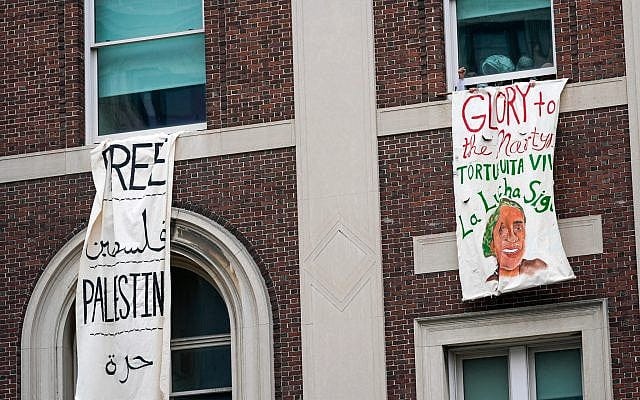
While in agreement with Lipstadt’s critique of Columbia, Professor Rosensaft explains his determination to continue to teach there and expresses his hope that the university can be reformed:
I hope that other Columbia faculty members, Jewish and non-Jewish alike, who have been appalled by the callously abhorrent behavior of radical activists, including some of their colleagues, will similarly stand their ground.
He explains his reasons as follows:
In the final analysis, this is why I continue to teach at Columbia: the students. And not only the Jewish students. The students in my class this semester are Jewish, Christian, Sikh, and, in all likelihood, Muslim and Buddhist. They are American, Italian, French, Australian, Indian and from a number of other countries. They deserve to be taught that antisemitism was the malignant cause of the Holocaust, just as anti-Muslim bigotry caused the genocide of Bosnian Muslims at Srebrenica, and just as ethnic hatred caused the genocide of Tutsis in Rwanda.
The vast majority of Columbia’s student body is made up of decent individuals who are neither antisemitic nor pro-Hamas. The same holds true for the university’s faculty, administrators and staff. I do not want to abandon them at the very moment when they are most in need of support.
Columbia President Responds to Federal Action (March 7, 2025)
Katrina Armstrong, the interim president of Columbia, posted a response to the revocation of funding on the university’s website. It may seem to say all the right things, but it doesn’t. Missing is a clear admission that Columbia lost its way and betrayed its mission and its Jewish students. It contains no commitment to take concrete remedial action, such as to abide by executive orders, enforce law and order on campus, and to punish violators. Instead of making a clear commitment to reform the university, it makes vacuous statements about values, and signals that Columbia will seek to pacify the feds rather than stop antisemitic harassment:
Today’s announcement will undoubtedly create anxiety and concern for our entire community. These impacts will touch nearly every corner of the University. But it is during periods like this that our collective dedication to this institution and our mission takes on critical importance.
Our north star has not changed. We are committed to education and research that will benefit our nation and our world. We believe in the power of knowledge to drive progress and improve lives. Our mission as a great research university does not waver.
Sustaining this mission requires us to actively nurture a community that values viewpoint diversity and rigorous, fact-based debate built upon mutual respect and personal accountability. Our ability to successfully fulfill our purpose depends on us defending these values. Antisemitism, violence, discrimination, harassment, and other behaviors that violate our values or disrupt teaching, learning, or research are antithetical to our mission. We must continue to work to address any instances of these unacceptable behaviors on our campus. We must work every day to do better.
“Continue to work” and “do better” just does not cut it anymore.
DOJ Opens Antisemitism Investigation Into the University of California System (Gabe Kamisky, The Free Press, March 5, 2025)
The Department of Justice has opened a civil rights investigation into the sprawling University of California system over concerns about antisemitism. …
In a letter sent Monday evening to the UC system and seen by The Free Press, the DOJ’s Civil Rights Division informed UC president Michael Drake of its investigation.
“Our investigation is based on information suggesting that since at least October 7, 2023, the University of California may be engaged in certain employment practices that discriminate against employees who are or are perceived to be Jewish or Israeli,” wrote DOJ officials Mac Warner and Michael E. Gates in the letter. “Accordingly, the Assistant Attorney General for the Civil Rights Division has authorized a full investigation to determine whether the University of California is engaged in a pattern or practice of discrimination as set forth above.”
“We were recently notified of the Department of Justice’s decision to initiate a civil rights investigation in the University of California system,” a spokesperson for the UC system told The Free Press. “We want to be clear: the University of California is unwavering in its commitment to combating antisemitism and protecting everyone’s civil rights. We continue to take specific steps to foster an environment free of harassment and discrimination for everyone in the university community.”
The investigation comes on the heels of the DOJ forming a task force in February made up of representatives from the Departments of Education and Health and Human Services to combat antisemitism. That follows the executive order President Donald Trump signed in his first days in office allocating federal resources to address “the explosion of antisemitism” on college campuses. The order, moreover, directed the DOJ to take immediate action to “quell pro-Hamas vandalism and intimidation, and investigate and punish anti-Jewish racism in leftist, anti-American colleges and universities.”
The antisemitism task force is being led by Leo Terrell, a civil rights attorney and recent Fox News contributor. It is under the auspices of the DOJ’s Civil Rights Division, an office that Trump tapped attorney Harmeet Dhillon, who has not yet been confirmed by the Senate, to lead.
See also Justice Department Launches Investigation into Allegations of Antisemitism at UC (by Jaweed Kaleem, the LA Times, March 6, 2025).
USC President Carol Folt Reflects on Her Tenure at USC: ‘You’re Not There to Necessarily Please People’ (By Hali Mecklin, Paige Shea, Laya Albert, and Mohammed Zain Shafi Khan, USC Annenberg Media, March 4, 2025)
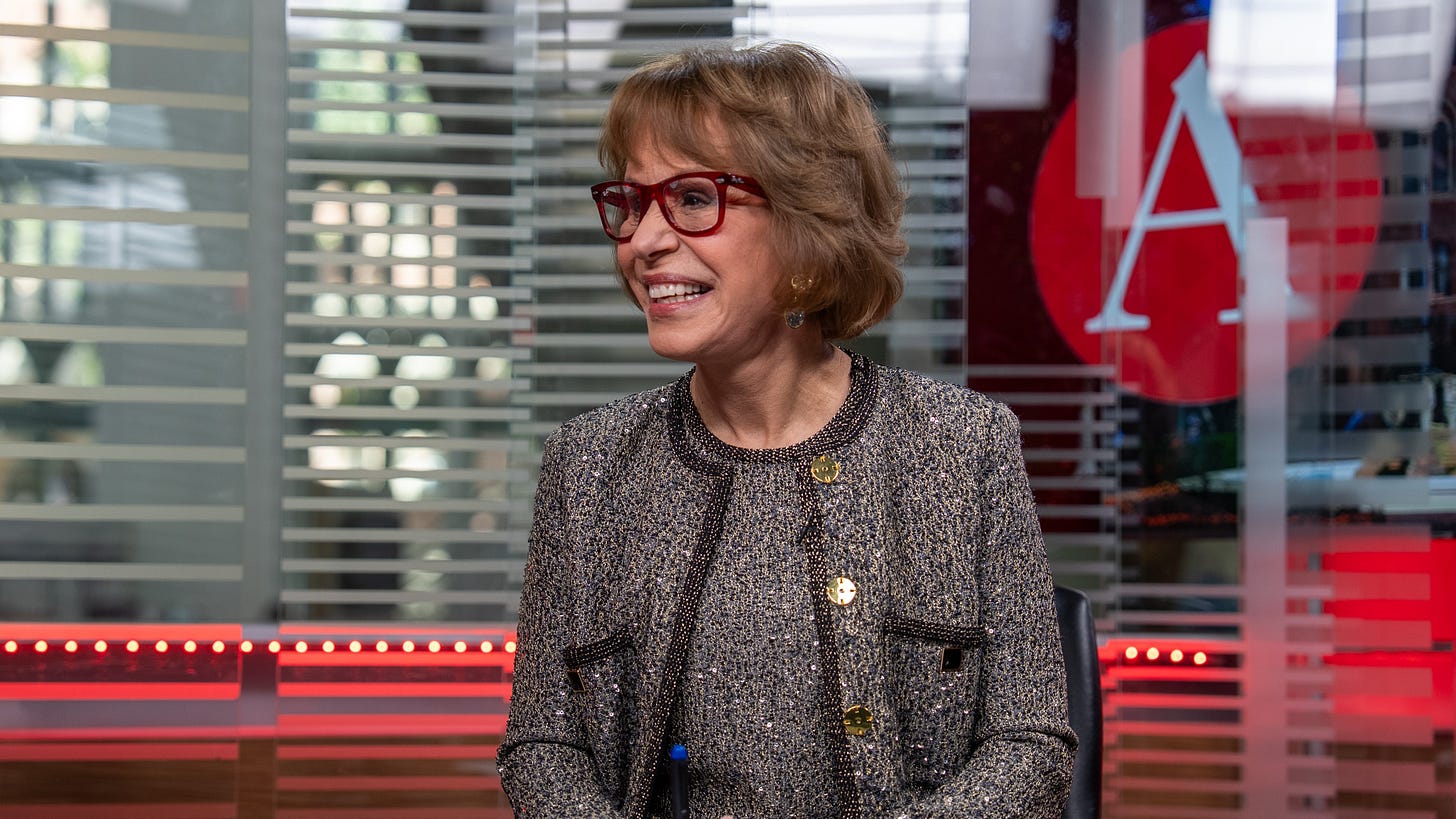
The interview is interesting and we recommend readers to read it in full. Below we highlight several specific points that caught our attention.
Folt’s presidency will conclude on June 30. The Board of Trustees named Beong-Soo Kim interim president in early February and announced the creation of a presidential search committee.
Folt spoke to student media just days after the university removed references to DEI programming from several department websites and merged the Office of Inclusion and Diversity into the USC Culture Team.
“I don’t think the university will [waver] from its commitment to being a place of opportunity, trying to be a [place of] social mobility, to the incredible student body that we have,” she said, referring to the DEI changes.
It is disappointing that Folt did not use this opportunity to disown this noxious ideology.
Folt also commented on the Federal Task Force for Antisemitism’s investigation into USC, the university’s response to last spring’s pro-Palestinian protests and the future of heightened campus security measures. Here are some of the most relevant topics she spoke about.
The Department of Justice’s Office of Public Affairs announced on Friday that the Federal Task Force to Combat Antisemitism will visit USC in the coming weeks to investigate the university.
“I think we have a really good record there,” said Folt, regarding the university’s response to antisemitism on campus. “We’ll certainly answer all their questions. And, you know, I think they’re going to find that we’ve been doing everything we can to be supportive of students.”
In 2022, the U.S. Department of Education investigated the university on a complaint filed by the Louis D. Brandeis Center for Human Rights Under Law on behalf of Rose Ritch, then-vice president of USC Undergraduate Student Government, who said she resigned due to antisemitic harassment.
More recently, Jewish students expressed displeasure with the university’s reaction and protocol changes following Hamas’ October 7, 2023 attack on Israel. On June 5, 2024, USC’s Chabad House, a center for Jewish students on campus, was vandalized in an overnight incident. Last May, officials found a swastika drawn on a campus fence.
The interlocutors also discussed security measures—checkpoints that limit campus access to USC students, faculty, and staff and registered guests.
One of the biggest changes on campus this academic year was the implementation of security checkpoints at every entrance to campus, as well as internal gates around Alumni Park, the site of the spring 2024 encampments. Despite the new fencing, Folt said that “no one is blocked from using” the parks.
A USG survey conducted after the fall 2024 semester found that 75% of student respondents did not want security checkpoints in place for the spring 2025 semester.
“I haven’t had many students come up and say they’re specifically not happy about the gates,” Folt said. “There [were] many people that [were] very pleased when they found out we could put these gates up.”
USC was previously an open campus for both students and the South L.A. community. However, the arrival of the security checkpoints has created a physical barrier between the school and its surrounding community. Folt emphasized that USC’s campus is still accessible to non-USC-affiliated locals, and said that visitors to campus are only required to present their IDs if they are not current USC students.
“We aren’t getting complaints from our neighbors because they are allowed to come in, and they feel very good about that,” she said. “Trust me — we’ve been out talking to all the leaders, all the time, about what that means, and they feel they still have access.”
Folt spoke about how the continuation of the security gates and checkpoints has coincided with a “significant” reduction in crime, both on and around campus. She said she estimated that crime had decreased by 20%.
“Our neighbors love it when there’s less crime around the campus as well,” said Folt. “You know, these are things that are complicated and there’s not a single viewpoint, but you try to find a solution that maximizes your attempt to be a good neighbor while also improving safety.”
Recent DPS data showed a 42% drop in reported crime on the University Park campus when comparing crime reports from August 2023 to January 2024 with those from August 2024 to January 2025.
The opposition to security measures that keep campus safe from crime and prevent access by outside agitators illustrates the extend of the ideological insanity on campus. A 42% drop in crime on campus—this is something to celebrate and to thank Folt for!
How one can object to a safe campus? The reasoning is Orwellian, as we discussed in USC Faculty Senate Releases Kangaroo Report; Provost Responds. It goes like this: “Safety” means different things to different people. Some define it as being safe from crime, while some define it as being safe from law enforcement while committing crime. And some faculty at USC think that both views are equally valid and need to be reconciled:
These two definitions highlight an inherent tension between safety as policing, and safety as an inclusive, community-based value. The question we face is: how can we bring these definitions together?
More from Folt on safety and the checkpoints:
When asked about the permanence of the gates, Folt said she cannot comment on anything past this spring after her tenure as president ends. She also did not give exact figures regarding the overall expense of the security checkpoints, and said “It costs us money, but it costs us money to do all sorts of things.”
“I know it is noticeable, but I think that really the goal is to try to have it not impede people’s ability to come in [and] go out,” she said.
Checkpoints cost money? Well, so does theft and vandalism. When the Michelson building first opened, the plasma screens adorning its halls were stolen within a couple of weeks—and in response, access to the building is now restricted. In our building (Seaver Science Center), we experienced a constant string of thefts from offices and labs, necessitating the department to install its own surveillance cameras. And what about the safety of our students—especially graduate students who often work after hours in labs?
The interview also discussed the protest of last spring:
Folt defended the university’s response to last spring’s protests, when the pro-Palestinian student group Divest from Death Coalition constructed an encampment demanding endowment transparency, divestment from Israel and amnesty for those disciplined for activism.
Folt insisted that the university followed its existing rules, stating that USC had not changed its time, place and manner policies on protesting. She defended the administration’s response, calling the situation complex and insisting that disciplinary actions aligned with established procedures.
She said the decision to bring in LAPD to break up the encampment came after consulting with various officials, including Mayor Karen Bass and Gov. Gavin Newsom.
“I wasn’t getting pressure. No one was calling me up and saying, ‘You do this, and we’re going to take your money away,’” she said, maintaining that safety was the driving force behind her decision. “I’m very proud of that.”
On the first day of the encampment, LAPD arrested 93 people, including 51 students. Days later, on April 27, hundreds of officers approached the encampment but withdrew without taking action. They returned on May 5, clearing the encampment in the early morning. At least 29 students later received interim suspension for their involvement in the protests, including at least four who were evicted from student housing.
“The last thing any president ever wants to do is to call the police,” Folt said. “It felt like we needed to do this to get ourselves in a place where we could keep people safe.”
Here, again, we think Folt is to be thanked for calling the police to enforce law and order, and to stop the disruption. Our only criticisms are that she waited too long to do so and that perpetrators were not punished to the full extent of the law.
And finally, on Valedictoriangate:
When asked what Folt would say to Tabassum if she had the chance, Folt said “I have talked to her. I would just say that I think she’s got an amazing future, and she’s working hard to make a big difference in the world.”
We found this response disappointing. The President missed the opportunity to make a principled statement. She could have reflected on our collective failure to educate this young woman and instill in her an appreciation of our “shared values,” which we are pretty sure preclude promoting genocidal death cults.
Public Largely Disapproves of Student Protests (Johanna Alonso, Inside Higher Ed, March 6, 2025)
This is an interesting study—and it emanated from USC! The gist of it—the adults think the students “doth protest too much” and that they should prioritize their duty to do well in the classroom over their political activities, especially when someone else—their parents or the taxpayers—are footing the bill.
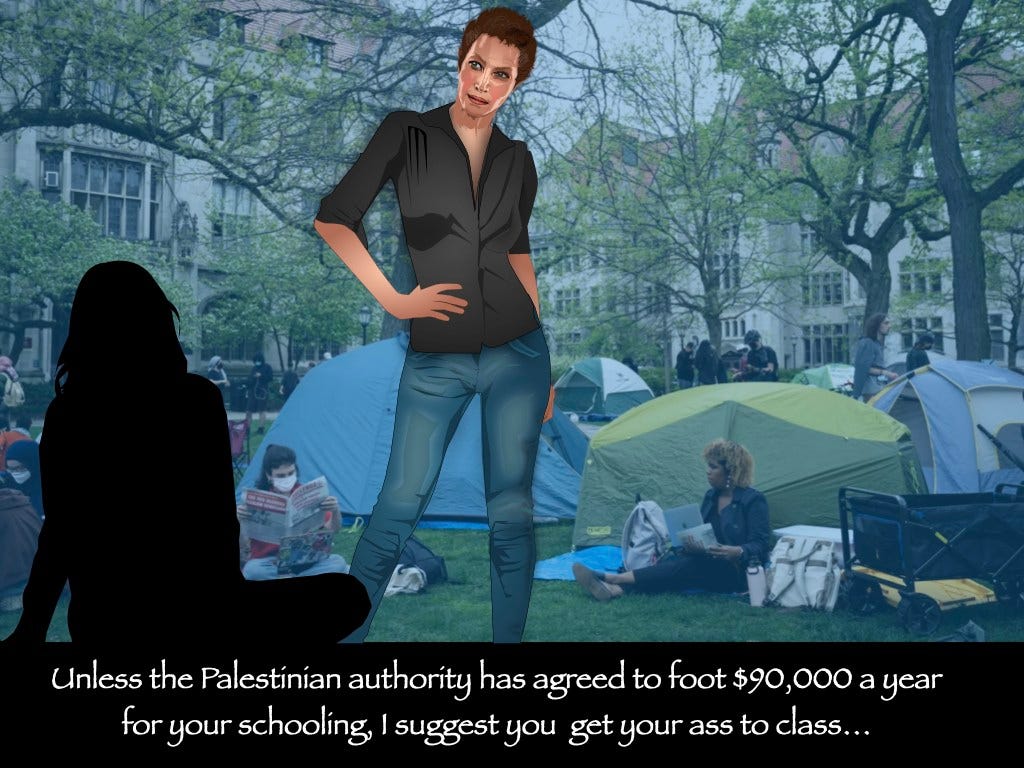
Ten months after pro-Palestinian encampments sprang up across U.S. college campuses, sparking backlash from politicians, university leaders and pro-Israel students and faculty, the public is still extremely critical of student protests, according to new research conducted by the Center for Applied Research in Education at the University of Southern California.
Conducted from October to December 2024, the survey asked 4,200 adults whether they thought certain student “free speech actions,” including criticizing their universities online, protesting world events by walking out of class or occupying campus buildings, were always, sometimes or never appropriate. More than half of respondents said several of the examples were never appropriate: leaving protest messages on property, shouting down speakers, occupying buildings in protest and disrupting graduation, which was the least popular protest action, with about eight in 10 people saying it was never appropriate.
Respondents were far more likely to approve of universities’ steps to stop protests, with 86 percent saying it was sometimes or always OK for police to arrest students who were breaking the law. Only slightly fewer, 79 percent, said it would be OK for police to break up a student protest—and the question didn’t even specify whether or not laws were broken.
Over all, every example of an institution’s response to protests received a higher approval rating than any example of a protest action.
This survey supports President Folt’s decision to call on the police to clear out illegal protests as well the general sentiment that universities are places for research and learning. The world would be a better place if faculty concentrated on teaching, students on studying, university leaders on protecting the mission of the institutions entrusted to them, and Anna cooking dinner for Jay rather than finishing this Substack.





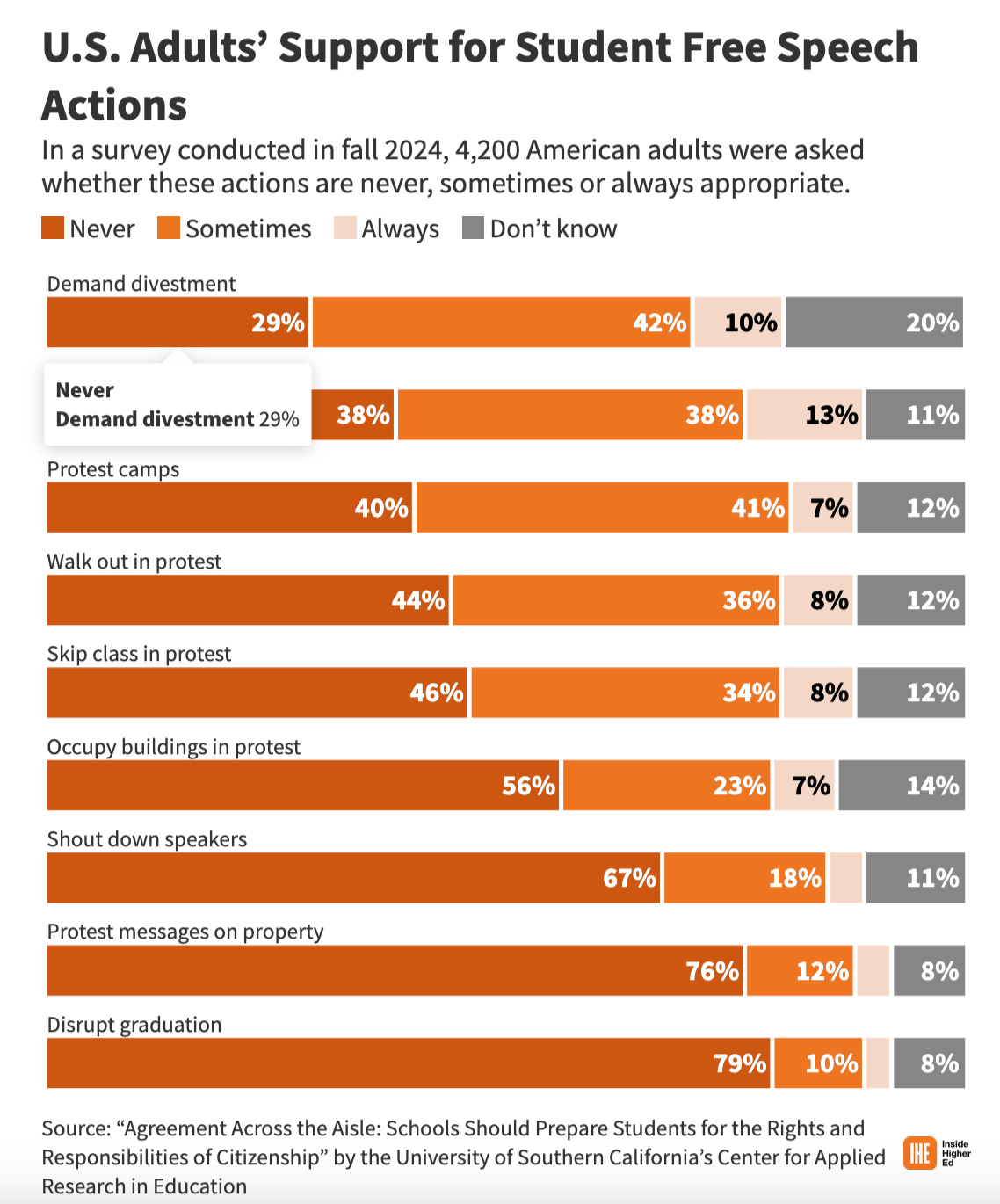
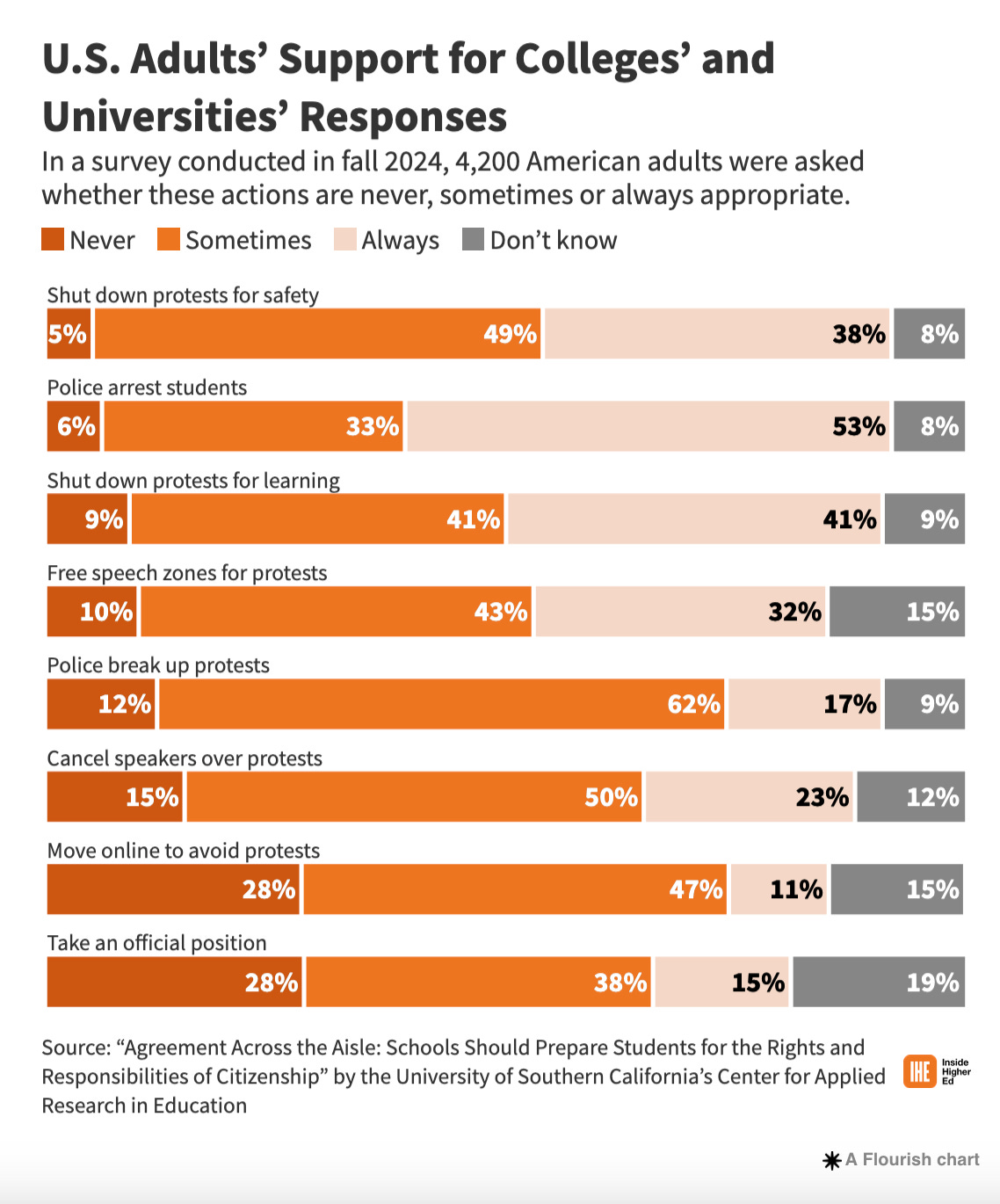
"though to what extent pro-Palestinian demonstrations on campus can be considered antisemitic remains in dispute." LOL
The NYT is a sad joke on the level of Soviet Pravda, packed with lies disguised by Orwellian Newspeak and doublethink.
Using the wrong pronoun or touching a black girl's hair is a hate crime deserving of a struggle session or worse, but harassing Jewish students, tearing down posters of their kidnapped relatives, painting the Jewish state as the world's most evil pariah, and campaigning to "Globalize the Intafada", which can only be construed as a call to attack Jews wherever you may find them, requires "context" and may not necessarily be "anti-Semitic".
The Social Justice faith turns its acolytes and their institutions into the exact opposite of what they claim to be: the most "educated" are the most ignorant, they claim to be tolerant but never tolerate dissent, and they constantly talk about fighting Nazis while defending Jew haters in their own backyard.
Hopefully Columbia is only the first of these Islamo-Leftist madrassas to feel some serious financial pain.
"Critics have warned that cutting off federal dollars is a blunt tool with which to punish colleges, given that most of that money goes to scientific research. As the economist Alex Tabarrok noted last month, “The problem is that the disciplines leading the woke charge—English, history, and sociology—don’t receive much government funding.” "
Sure, Alex. Everyone knows that English, history, and sociology departments are the biggest profit centers universities have. Why didn't I think of that? Where would we be without "critics," aka "experts" ?
As for STEM profs--good ones can write their own tickets at other universities. No one said they're welded to Columbia, or to any other school, for that matter.